
An Essential Guide to Skipping the Germs and Staying Healthy
Why Skipping the Germs Matters More Than Ever
Skip the germs isn't just a catchy phrase—it's a critical health strategy that can prevent illness, reduce sick days, and keep your workplace running smoothly. Whether you're managing a funeral home, working in healthcare, or simply trying to stay healthy, understanding how to effectively avoid harmful microbes is essential.
Quick Ways to Skip the Germs:
- Wash hands for 20 seconds with soap and water before eating, after using restrooms, and after touching shared surfaces
- Use hand sanitizer with at least 60% alcohol when soap isn't available
- Clean high-touch surfaces like keyboards, phones, and doorknobs daily
- Avoid touching your face with unwashed hands
- Stay home when sick to prevent spreading germs to others
The research is clear: many diseases spread simply through touch, and germs live everywhere—in air, on surfaces, and even on money (94% of dollar bills have traces of fecal bacteria). But here's the good news: simple hygiene practices can reduce respiratory illness by 16-21% and diarrheal illness by 23-40%.
The key isn't becoming a germaphobe or over-sanitizing everything. As one expert noted, "it's possible to be overly vigilant about avoiding germs," which can actually weaken your immune system over time. The goal is smart, consistent habits that protect you without going overboard.
I'm Mortuary Cooler, and through years of working with funeral home directors who understand the critical importance of hygiene and sanitation, I've seen how proper practices to skip the germs can protect both staff and families during their most vulnerable moments. My experience in the mortuary equipment industry has taught me that effective germ prevention starts with understanding the basics and implementing practical, sustainable solutions.
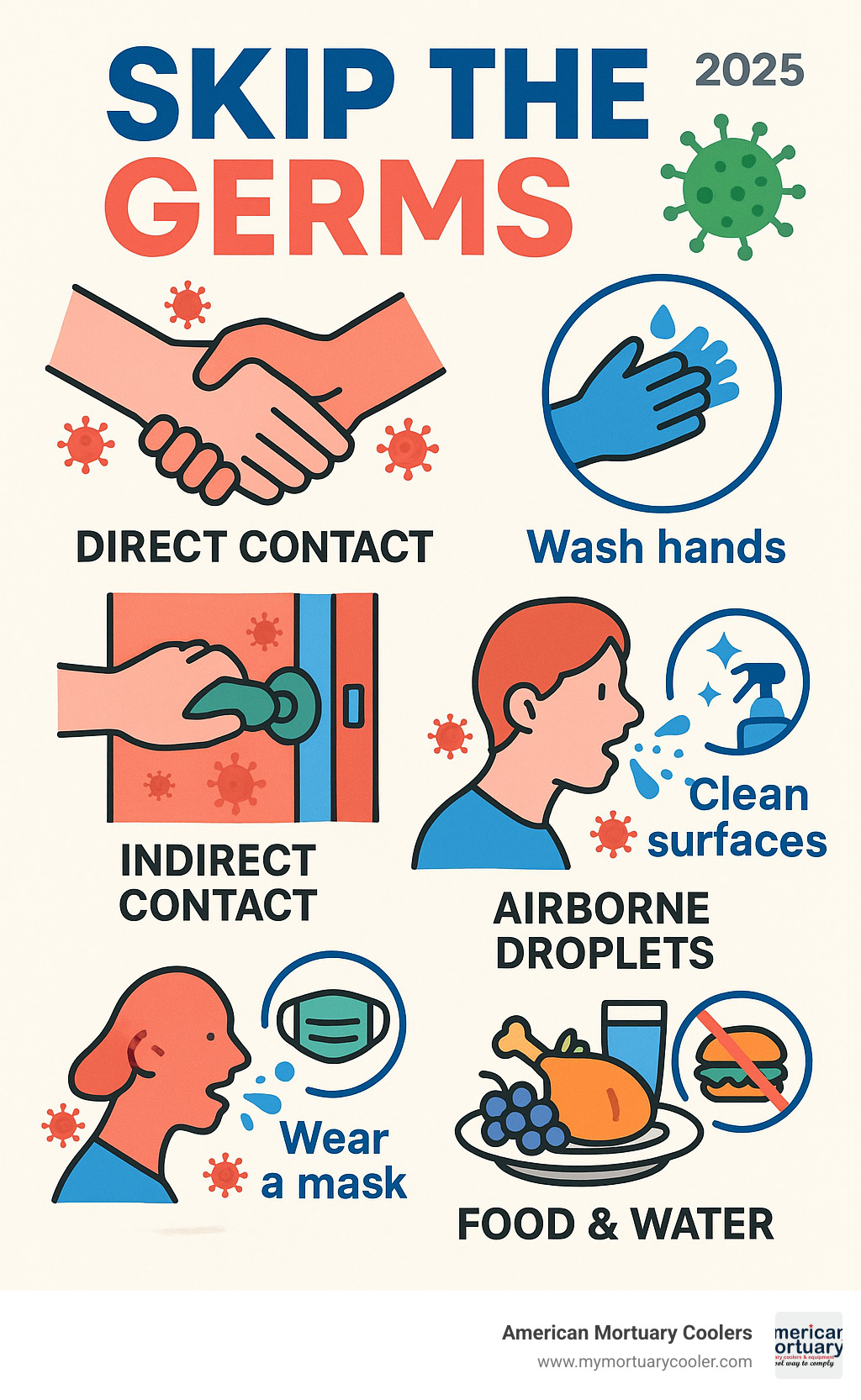
Understanding Germs and How They Invade Our Lives
Think of germs as invisible hitchhikers that travel everywhere we go. To effectively skip the germs that can make us sick, we first need to understand what we're dealing with and where they like to hang out.
Germs—also called microbes—are tiny organisms living all around us. They're in the air we breathe, on the surfaces we touch, and even in the food we eat. Most germs are actually harmless, and some are even helpful! The trouble comes from the small percentage that can cause infections and make us sick.
The difference between an infection and a disease is important to understand. An infection happens when harmful germs enter your body and start multiplying. A disease occurs when those germs actually make you sick with symptoms. Sometimes your immune system fights off infections before they become diseases.
Germs spread through several main pathways: direct contact (like shaking hands), indirect contact (touching contaminated surfaces), airborne droplets (from coughs and sneezes), and through contaminated food or water.
What Exactly Are Germs?
Bacteria are single-celled organisms that multiply rapidly. Some bacteria in our intestines actually help us digest food—they're the good guys. But others like E. coli and Staphylococcus aureus can cause serious trouble. Your keyboard and mouse can host thousands of these little critters.
Viruses are sneaky. They're not even real cells—just tiny capsules carrying genetic material. They hijack your body's cells to make copies of themselves. Common cold viruses, flu, and COVID-19 all work this way. Unlike bacterial infections, you can't treat viruses with antibiotics.
Fungi include the yeast that makes our bread rise and the mold that ruins our leftovers. While some fungi are useful, others cause infections like athlete's foot. Protozoa act like tiny animals, hunting other microbes for food. Some cause diseases like malaria.
Everyday Germ Highways You Should Know
Money might be the dirtiest thing you touch regularly—94% of dollar bills have traces of fecal bacteria. Your smartphone is another germ magnet. Studies of teenage phones found E. coli, staph, and strep bacteria living on screens.
Airport security trays are surprisingly germier than airplane restrooms. Public transit increases your cold risk by six times compared to driving your own car. Even at home, your kitchen sponge can harbor 99% of bacteria if you don't clean or replace it regularly.
Balancing Cleanliness & Immunity: The Hygiene Hypothesis
The hygiene hypothesis suggests that our immune systems actually need some germ exposure to develop properly. Children who attend daycare get more viruses early on but develop fewer allergies later in life. Farm kids have lower rates of allergic conditions.
The sweet spot is balanced protection—avoiding dangerous pathogens while allowing normal exposure to common microbes. We want to skip the germs that can cause serious illness without becoming so sterile that we weaken our natural defenses.
Scientific research on germs and infections shows that smart hygiene practices provide the best protection for long-term health.
Master Hand Hygiene to Truly Skip the Germs
If you want to skip the germs, your hands are your first line of defense. The CDC calls handwashing one of the most important things you can do to avoid getting sick.
The 8-Step Wash That Helps You Skip the Germs
Here's the method that actually works, backed by scientific research on handwashing efficacy.
Start by wetting your hands with clean, running water before you add soap. Then apply enough soap to create a good lather across your entire hand surface.
Scrub for at least 20 seconds—sing "Happy Birthday" twice through. Pay special attention to the backs of your hands, between your fingers, under your fingernails, and around your thumbs.
Rinse thoroughly under clean running water while rubbing your hands together. Turn off the faucet using your elbow or a paper towel. Dry completely with a clean towel, then exit without touching door handles if possible.
Plain Soap vs. "Antibacterial" Claims
The FDA says there's no proof that antibacterial soaps work better than regular soap and water for preventing illness. The FDA banned 19 ingredients from consumer soaps in 2016, including triclosan and triclocarban, due to safety concerns.
Regular soap with proper technique is still one of the most effective ways to skip the germs. If you want to explore your options, you can find more info about clean-hands options that cuts through the marketing hype.
When Hand Sanitizer Beats Soap—And Choosing the Right One
Alcohol-based sanitizers need at least 60% alcohol to work against most germs. They're fast-acting but can dry your hands with frequent use.
Non-alcohol alternatives like benzalkonium chloride (BZK) offer a gentler approach. Products using 0.1% benzalkonium chloride provide broad-spectrum protection without harsh drying effects. These products are both Health Canada and FDA approved.
| Alcohol-based Sanitizers | Non-alcohol (BZK) Sanitizers |
|---|---|
| 60%+ alcohol required | 0.1% benzalkonium chloride |
| Fast-acting | Longer-lasting protection |
| Can dry/crack skin | Often includes moisturizers |
| Widely available | More specialized products |
| Flammable | Non-flammable |
The choice depends on frequency of use. For occasional use, alcohol-based works fine. For frequent sanitizing throughout the day, BZK formulations will keep your hands healthier.
Germ Hotspots at Work, Home & On the Go
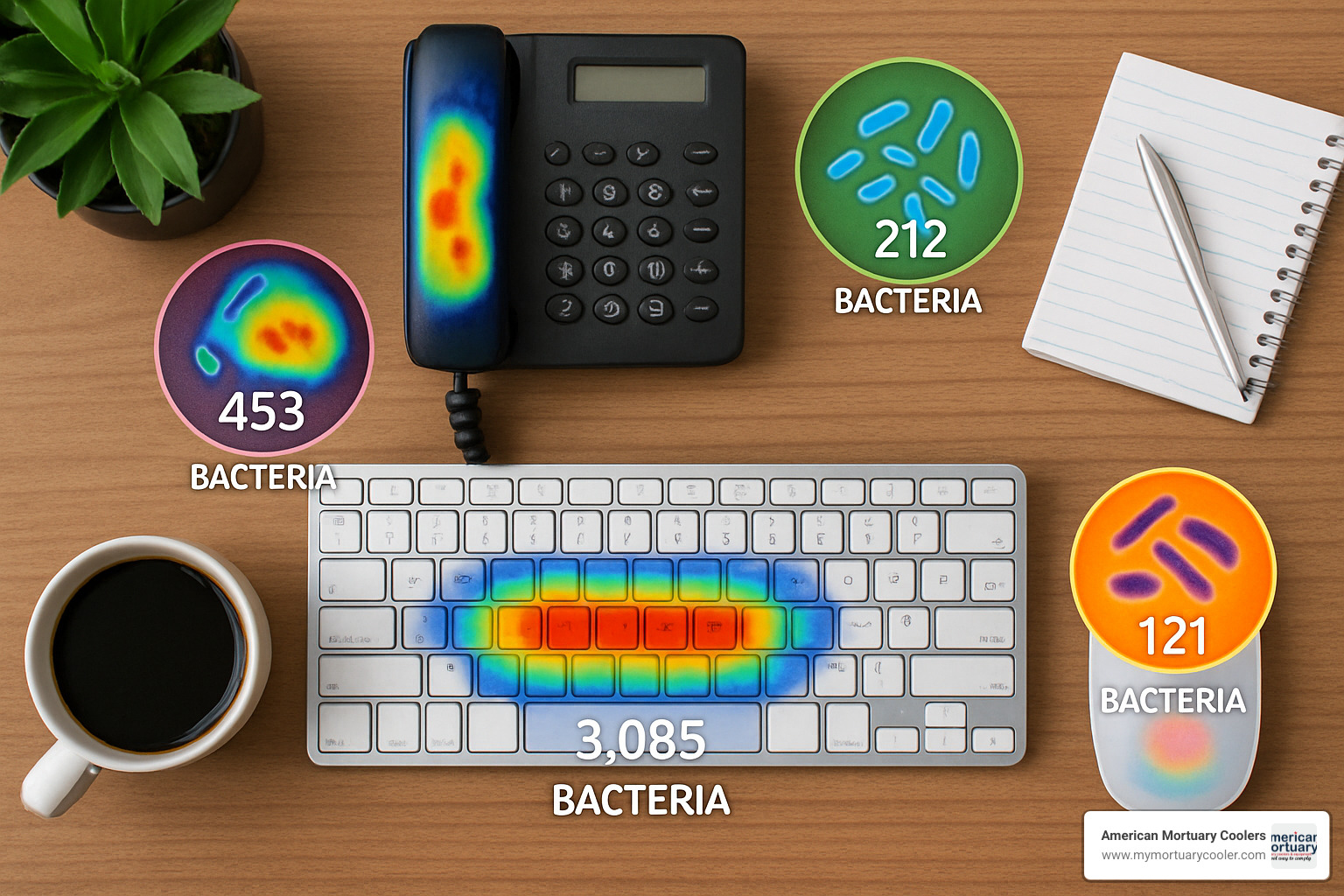
Knowing where germs congregate helps you skip the germs with precision rather than sanitizing everything in sight.
Office Zones That Harbor Trouble
Your workspace hosts a microscopic convention of unwanted guests. Research shows that keyboards and mice can harbor thousands of bacteria, including E. coli and Staphylococcus aureus.
Your keyboard spaces between keys are like tiny condominiums for bacteria. A daily wipe with antibacterial wipes goes a long way. Phones get breath moisture and constant skin contact—they need daily cleaning with alcohol wipes.
Shared office equipment like copiers and coffee makers are community germ exchanges. Make it a habit to sanitize after each use, or use hand sanitizer immediately afterward. Don't forget doorknobs and light switches—these high-traffic spots deserve daily attention.
Kitchen Danger Zones & How to Skip the Germs
Cleaning experts agree that the kitchen is "unquestionably the germiest place in our home."
Kitchen sponges are the worst offenders. Microwave your sponge for 30 seconds, then toss it in the dishwasher. This eliminates 99% of bacteria.
Cutting boards and counters need hot, soapy water first, followed by a bleach solution (one teaspoon per quart of hot water). Kitchen sinks often harbor more germs than toilet bowls. Pour hot water down the drain each night, then give it a bleach soak twice weekly.
When handling raw meat, those tongs become contaminated instantly. If you want to reuse them for serving, they need immediate washing in hot, soapy water with sanitizing solution.
Travel Tactics to Skip the Germs in Public Spaces
Airport security trays are germier than airport restrooms. Hit the hand sanitizer immediately after clearing security. On planes, tray tables get wiped down between flights if you're lucky. Pack sanitizing wipes and clean your immediate area—armrests, seatbelt buckles, and window shades.
Your smartphone needs extra attention when traveling. Daily cleaning with alcohol wipes becomes essential. Public transit increases your cold risk by six times compared to traveling by car. Use barriers like scarves, avoid face-touching, and practice good hand hygiene at your destination.
Air & Surface Defenses Beyond Handwashing
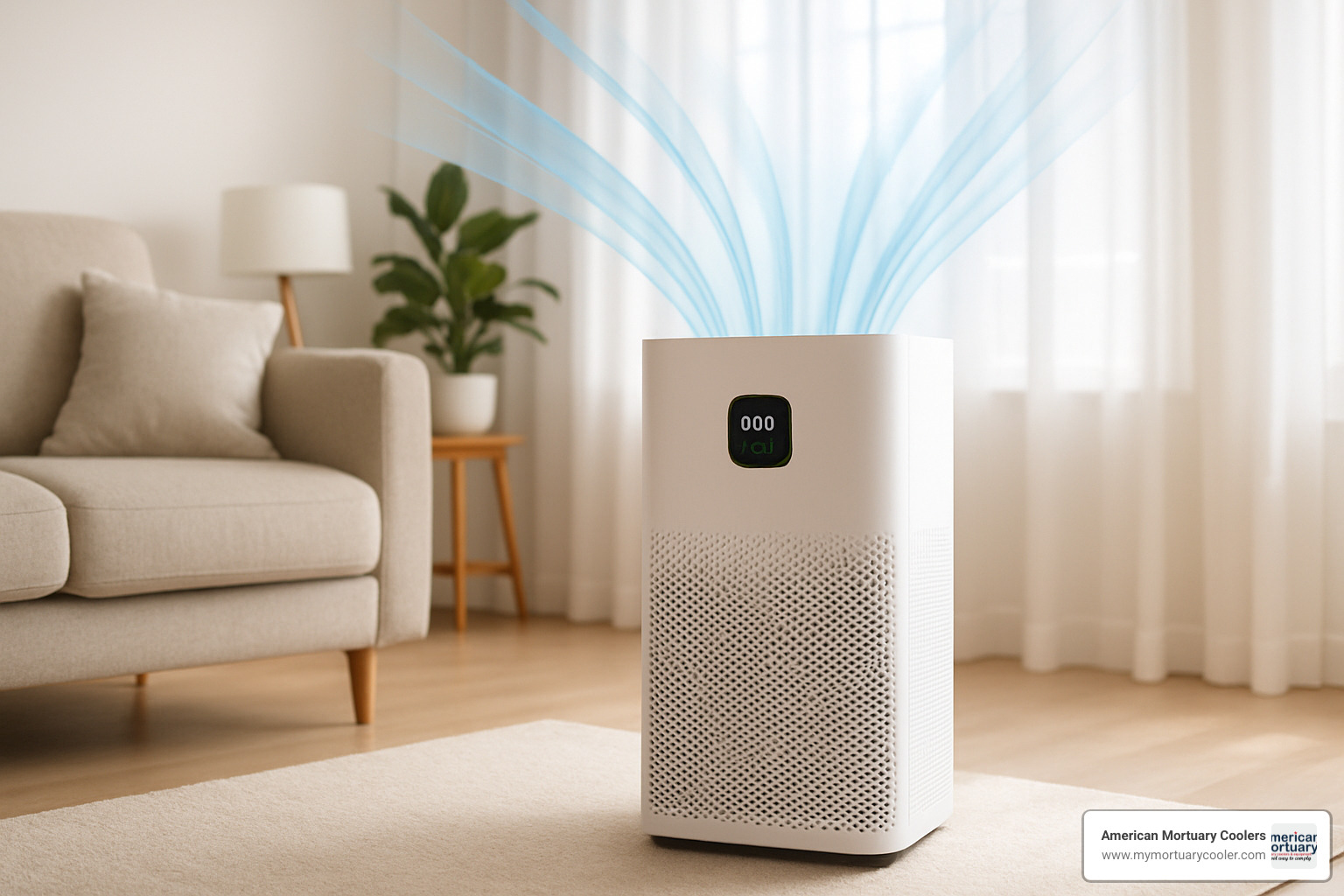
To truly skip the germs, you need to think beyond handwashing. The air you breathe and surfaces around you can either work for you or against you.
Breathing Easier: Purifiers, Ventilation & Humidity
HEPA filters capture 99.97% of airborne particles as small as 0.3 microns, including bacteria and many viruses. Look for high CADR ratings and place them in high-traffic areas.
Good ventilation works like a natural dilution system for airborne pathogens. Humidity control matters too—the sweet spot is 40-60% relative humidity. Don't forget maintenance schedules—replace filters on time to keep everything running effectively.
Smart Surface Disinfection Routines That Stick
EPA-registered disinfectants have proven they can do the job, but most need contact time to work properly—sometimes several minutes of staying wet on the surface.
Hit your high-touch surfaces multiple times daily: doorknobs, light switches, phones, keyboards, and shared equipment. Color-coded cleaning cloths prevent cross-contamination between areas.
Proper technique beats expensive products: clean visible dirt first, then apply disinfectant and give it time to work before wiping.
Choosing a Sanitizer: Alcohol Gel, BZK Lotion or Both?
Alcohol gels work fast and kill most pathogens on contact, but can dry your hands with frequent use. BZK lotions use 0.1% benzalkonium chloride and include moisturizing ingredients, providing longer-lasting protection without skin damage.
My recommendation? Keep both types handy. Use alcohol-based for quick disinfection when out and about, and BZK-based lotions for regular workday use. For extra protection in messy situations, more info about nitrile glove protection can help you choose barrier protection.
Building a Culture of Clean Without Going Overboard
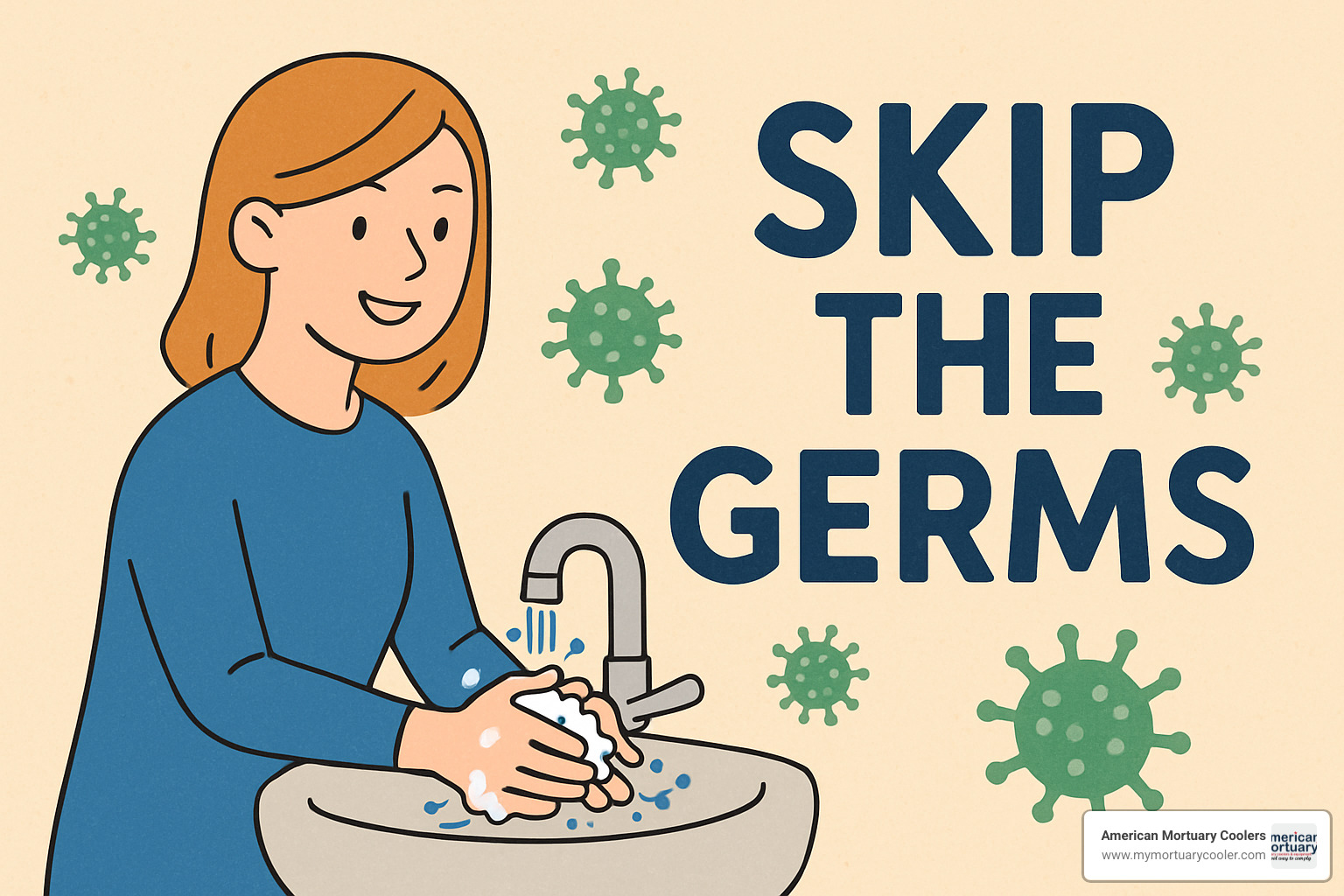
Creating lasting habits to skip the germs requires shared responsibility and smart systems.
Educate, Empower & Remind—Skip the Germs Together
Hygiene ambassadors can model and promote cleanliness behaviors. Appointing enthusiastic team members as "hygiene champions" helps reinforce good practices naturally.
Visual cues work better than verbal reminders. Post handwashing instructions at sinks, place sanitizer stations at entry points, and use signage for high-touch surface cleaning reminders.
Workshops and training should cover proper techniques. Many people think they know how to wash hands properly, but few actually scrub for the full 20 seconds or clean under their nails effectively.
Organized Spaces Equal Fewer Germs
Decluttering isn't just aesthetic—it's hygienic. Fewer items on surfaces means easier cleaning and fewer places for germs to hide.
Designated eating areas prevent food contamination and make cleaning more manageable. Storage solutions keep personal items organized and reduce surface contamination. Regular audits help maintain standards over time.
Too Clean? Understanding When to Chill
The hygiene hypothesis shows it's possible to be too clean. Overly hygienic environments can under-stimulate the immune system, leading to higher rates of allergies and asthma.
Balanced approaches focus on preventing dangerous pathogens while allowing normal environmental exposure. You don't need to sanitize every surface constantly—target high-risk situations and high-touch areas instead.
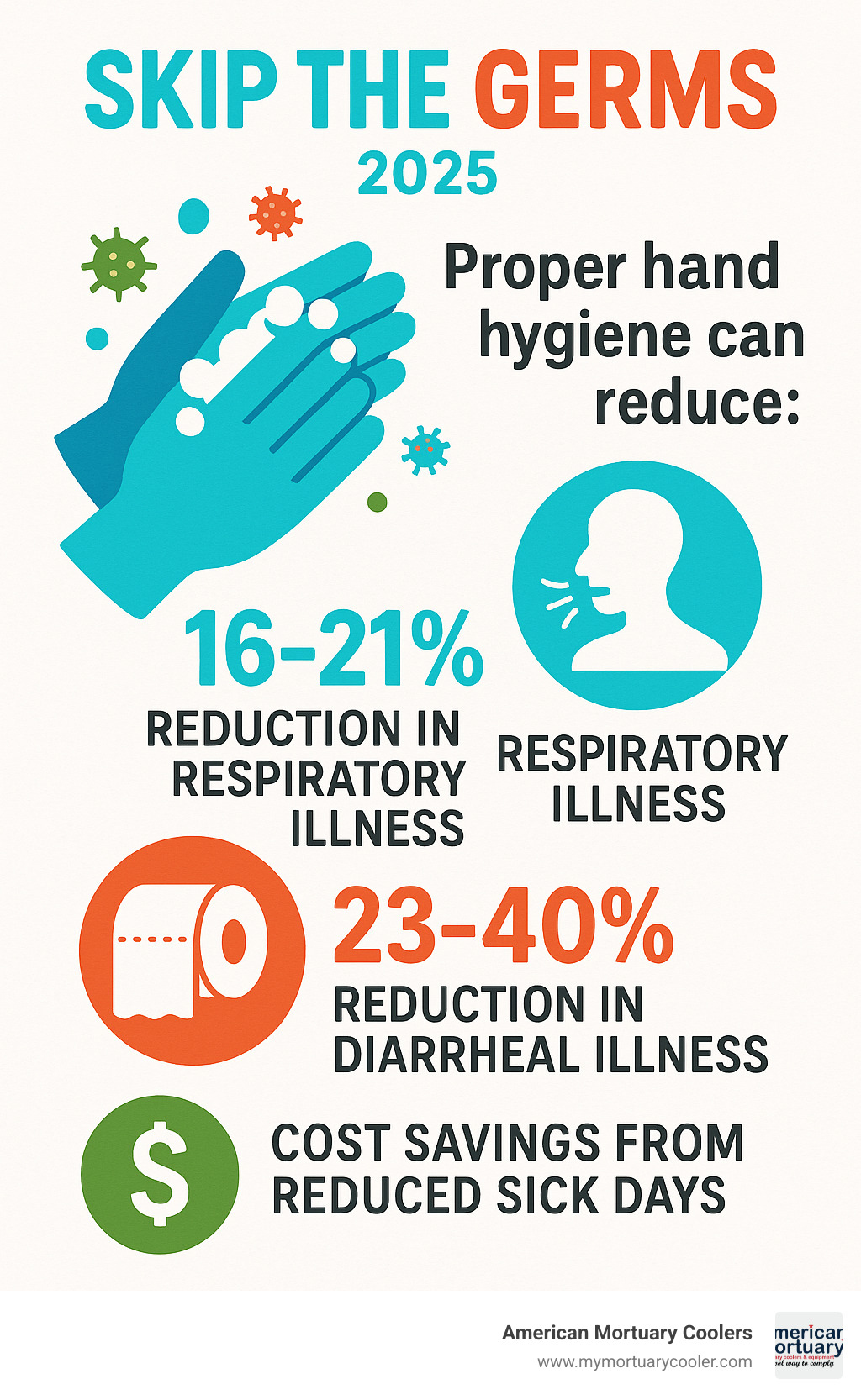
Frequently Asked Questions about Skipping the Germs
Let's tackle the most common questions I hear about germ prevention. These come up constantly in conversations with funeral directors and facility managers who need reliable, science-backed answers.
Do antibacterial soaps work better than regular soap?
Here's something that might surprise you: the FDA says no. After years of research, there simply isn't enough evidence that over-the-counter antibacterial soaps prevent illness better than plain soap and water.
The real power comes from the mechanical action of scrubbing. When you lather up and scrub for 20 seconds, you're physically removing germs from your skin. The soap helps lift dirt and oils that trap bacteria, and the scrubbing action dislodges them from all those tiny crevices on your hands.
In 2016, the FDA actually banned 19 antibacterial ingredients including triclosan and triclocarban because manufacturers couldn't prove they were safer or more effective than regular soap. So save your money and stick with plain soap—it's just as effective at helping you skip the germs.
Is alcohol-free sanitizer as effective?
Absolutely, when it's formulated correctly. Benzalkonium chloride (BZK) at 0.1% concentration is both Health Canada and FDA approved as an effective sanitizing agent. This might be news to people who think only alcohol-based sanitizers work.
The big advantage of BZK formulations is they're gentler on your skin. While alcohol-based sanitizers can cause dry, cracked skin with frequent use, BZK products often include moisturizing agents like olive oil and aloe vera. This makes them perfect for people who need to sanitize their hands repeatedly throughout the day.
Products like "Skip The Germs" use this gentler approach while still providing the antimicrobial protection you need. It's particularly valuable in healthcare settings or funeral homes where staff are constantly sanitizing but can't afford to have damaged, painful skin.
Can you be "too clean" and hurt your immunity?
Yes, and this is where the hygiene hypothesis becomes really important. Early exposure to everyday microbes is actually necessary for proper immune system development.
Think about it this way: your immune system is like a muscle that needs training. Children in overly sterile environments often show higher rates of allergies and asthma because their immune systems haven't learned to distinguish between harmful pathogens and harmless environmental microbes.
The goal isn't to eliminate every single germ—it's balanced hygiene. We want to prevent dangerous pathogens while allowing normal environmental exposure that trains the immune system. This is why we focus on "skipping" germs rather than declaring war on all microbes.
Farm children and those in daycare actually develop stronger immune systems and fewer allergies later in life. They get more early exposure to various microbes, which teaches their immune systems how to respond appropriately.
The key is being smart about it: skip the germs that cause serious illness while letting your immune system encounter the everyday microbes that keep it properly calibrated.
Conclusion
The journey to skip the germs doesn't require perfection—just smart, consistent habits that become second nature.
The most powerful tool? Your hands and plain soap. That 20-second scrub removes germs more effectively than expensive antibacterial products. When soap isn't available, use hand sanitizer with at least 60% alcohol or proven alternatives like benzalkonium chloride.
Clean those high-touch surfaces regularly—keyboards, phones, doorknobs, and light switches harbor surprising amounts of bacteria. Good air circulation helps dilute airborne germs, and decluttering makes everything easier to keep clean.
Some exposure is actually good for you. The hygiene hypothesis shows our immune systems need practice to stay strong. It's about finding that balance between protecting yourself from harmful pathogens and letting your body encounter everyday microbes that keep your defenses sharp.
At American Mortuary Coolers, we've worked with funeral professionals across Tennessee, Georgia, Illinois, and throughout the contiguous 48 states who understand this balance. In environments where hygiene and respect intersect, proper germ prevention practices protect both staff and grieving families during vulnerable moments.
The habits you build today will reduce sick days, boost your overall health, and give you confidence in any situation. Start with your hands, expand to your workspace, and remember—consistency beats intensity every time.
Ready to create a cleaner, healthier environment? More information about mortuary coolers and professional hygiene solutions can help you maintain the highest standards.




